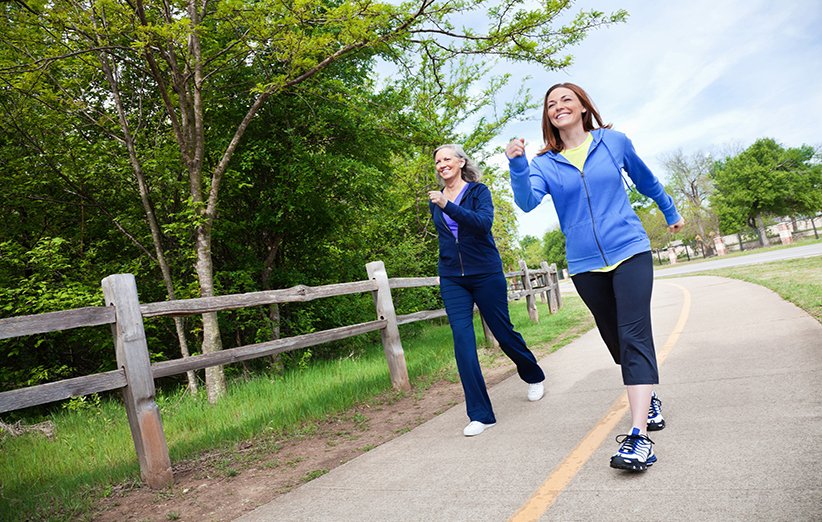Here, we look at the significant and beneficial effects of walking on mental and physical health. In today’s world, we all face a lot of pressure and stress that may negatively affect our health. This is where walking helps us as a simple and effective solution.
The importance of maintaining mental and physical health in today’s society is felt more than ever. Daily activities, technology, and environmental pressures may decrease relaxation and increase stress. Solutions to improve and maintain health are needed, and walking is one of them.
Starting with this article, we will show you how walking can affect our mental health and the positive physical effects. From reducing stress to increasing relaxation and heart health, these are all among the effects that can be achieved by walking.

Positive effects of walking on mental health
Walking, as a beneficial activity, leads to the improvement of people’s mental health. This simple activity can affect our mood and state of mind
Reducing stress and anxiety:
When we walk, our bodies relax, reducing the stress and worry in our minds. It is an opportunity to escape all those daily worries and connect with nature.
Increasing positive energy:
Walking can increase our internal positive energy. Moving outdoors and watching nature can make us feel more refreshed and motivated.
Increasing relaxation and concentration:
This activity helps us find inner peace and focus on our daily tasks. Walking promotes mental flexibility and the best brain abilities.
Improve emotional state:
Research has shown that walking activity can significantly improve our emotional state. People who walk regularly see increased satisfaction and happiness in their lives.
Positive effects of walking on physical health
Walking, an easy sports activity, has many positive effects on physical health. It can help improve physical performance and reduce the risk of many diseases.
Cardiovascular strengthening:
Regular walking strengthens cardiovascular muscles. This activity helps the heart pump better and improves vascular function, which improves overall cardiovascular health.
Reducing the risk of chronic diseases:
Walking, as a mild exercise activity, can help reduce the risk of chronic diseases such as diabetes, high blood pressure, and some cardiovascular diseases.
Fitness and weight control:
This activity helps to control weight and can be effective in the process of reducing obesity and fitness. Walking burns extra calories and helps people maintain a healthy weight.
Muscle strengthening and body strength:
Walking strengthens the muscles by moving the legs and lower body. This activity can enhance the primary muscles and improve body balance.
Increased tolerance and stability:
Regular walking improves the body’s endurance and physical stability, helping people show better endurance for their daily activities.
Effects of walking on stress reduction
Walking, as a relaxing and coherent activity, reduces stress levels and daily pressures. This close and direct relationship between walking and stress reduction is one of the activity’s important and positive aspects.
Relaxation and concentration:
While walking, we connect with the calm and peaceful atmosphere of nature. This connection and this space distance us from all those daily worries and pressures and make our minds more relaxed and focused.
Increase in benign hormones:
Exercises such as walking release benign hormones like endorphins that make us feel good. These hormones act as anti-stress and anti-anxiety and promote positive emotions.
Regulation of emotional state:
Walking helps us regulate our emotional state. It allows us to reduce negative thoughts and balance our emotional state.
Focus on breathing and mental relaxation:
Walking makes us pay more attention to breathing, which causes relaxation and mental concentration. This state of concentration and relaxation helps us deal with negative thoughts and better manage everyday stress.
Effects of walking on cardiovascular strengthening
Walking is one of the best ways to strengthen our cardiovascular system. This easy but very effective activity has significant effects on our cardiovascular health.
Strengthening the heart muscles:
When we walk, our heart pumps blood harder and harder, strengthening the heart muscles.
Increased vascular function:
Walking causes blood vessels to expand and helps to improve their function. This increase in vascular function enhances blood circulation and better blood transfer to different organs.
Reducing the risk of heart disease:
Walking regularly can help reduce the risk of heart disease, high blood pressure, and other cardiovascular problems.
Reducing harmful fats:
Walking increases the body’s metabolism and reduces harmful fats. Reducing harmful fats improves vascular health and reduces the risk of heart problems.
Proper fit and weight:
Fit and appropriate weight from the positive effect of walking
This activity can help with weight control and maintaining a healthy weight and fitness, which is generally beneficial for cardiovascular health.

The role of walking in reducing depression
Walking, a quiet and indirect sports activity, can affect people’s mental health. It can also help reduce depression and increase positive energy.
Increased production of benign hormones:
Walking can increase the production of benign hormones such as endorphins, which act as anti-stress and anti-depressants and give us energy and happiness.
Reducing anxiety and depression:
Moving outdoors and connecting with nature reduces stress and depression. Walking allows us to relax for a while by taking our minds off of everyday issues.
Increased energy and relaxation:
Walking increases internal positive energy and mental relaxation. This feeling of positive energy helps us cope with depression and avoid sadness.
Increasing self-control and self-confidence:
Walking gives us more confidence and strengthens our sense of self-control. This feeling helps with coping with depression and anxiety.
Improve social interaction:
Walking can improve our social interactions with others. Being outdoors and connecting with others gives us a greater sense of belonging and connection, which helps reduce depression.
The positive effects of walking on strengthening the immune system
Walking activity is vital to enhancing the human body’s immune system. This activity strengthens and increases the body’s resistance to diseases and dangerous factors.
Strengthening immune cells:
Walking strengthens immune system cells. This activity increases the number and efficiency of immune cells against microbes and harmful agents.
Increased secretion of antibodies:
Exercises such as walking increase the secretion of antibodies that help us resist various infections and diseases.
Reduce inflammation:
Walking can help reduce inflammation in the body. This reduction of inflammation improves the overall immune system and protects the body against diseases.
Regulation of stress hormones:
Walking regulates stress hormones. Reducing stress and daily pressures is important in strengthening the body’s immune system.
Increasing public health performance:
This activity can affect the improvement of the body’s general function, and increasing the level of immunity helps us to have better health and be more resistant to diseases.
final word
Walking is a simple but effective activity that improves mental and physical health. It can easily be incorporated into daily life and has significant effects.
Walking improves the cardiovascular system and strengthens the function of the heart muscles. This activity can also help reduce stress and depression and give us peace and freshness. Combining walking with healthy eating and other activities can guarantee an overall improvement in our health and mood.
Remember that walking with small, gradual steps can help improve your health. Over time, this simple activity can become a healthy and helpful habit, and you will feel its positive effects in your daily life
common questions
1. Is walking at any hour of the day helpful?
Yes, walking at any hour of the day benefits you. Even at least 30 minutes of daily walking can help improve physical and mental health.
2. Is it better to walk outdoors or indoors?
Both types of walking offer unique benefits. Outdoor walking provides a more relaxed feeling by increasing contact with nature, which can be invigorating. On the other hand, indoor walking can be a convenient option in inclement weather or when access to the outdoors is limited, ensuring you never miss a day of your walking routine.
3. Can walking help lose weight?
Yes, walking can help you lose weight. This activity burns calories, increases energy levels, and controls weight.
4. Does the regular walking program require special equipment?
No special equipment is needed for hiking. Appropriate shoes and comfortable clothes can be sufficient. You can also use pedometer bracelets or exercise apps if you want.
5. Is hiking suitable for beginners?
Yes, hiking is a suitable and easy activity for beginners. Starting with small steps and gradually increasing the distance and speed will help less experienced people gradually increase their activity.
6. Is walking suitable for older people?
Yes, walking is a suitable, low-stress activity for the elderly. This activity helps maintain flexibility, strengthen muscles, and reduce the risk of cardiovascular diseases. Medical advice is recommended before starting.
7. Is walking suitable for those with joint problems?
Yes, walking is a good option for those with joint problems. This activity is low stress on the joints and can help strengthen muscles and improve flexibility. Also, medical advice is recommended.
